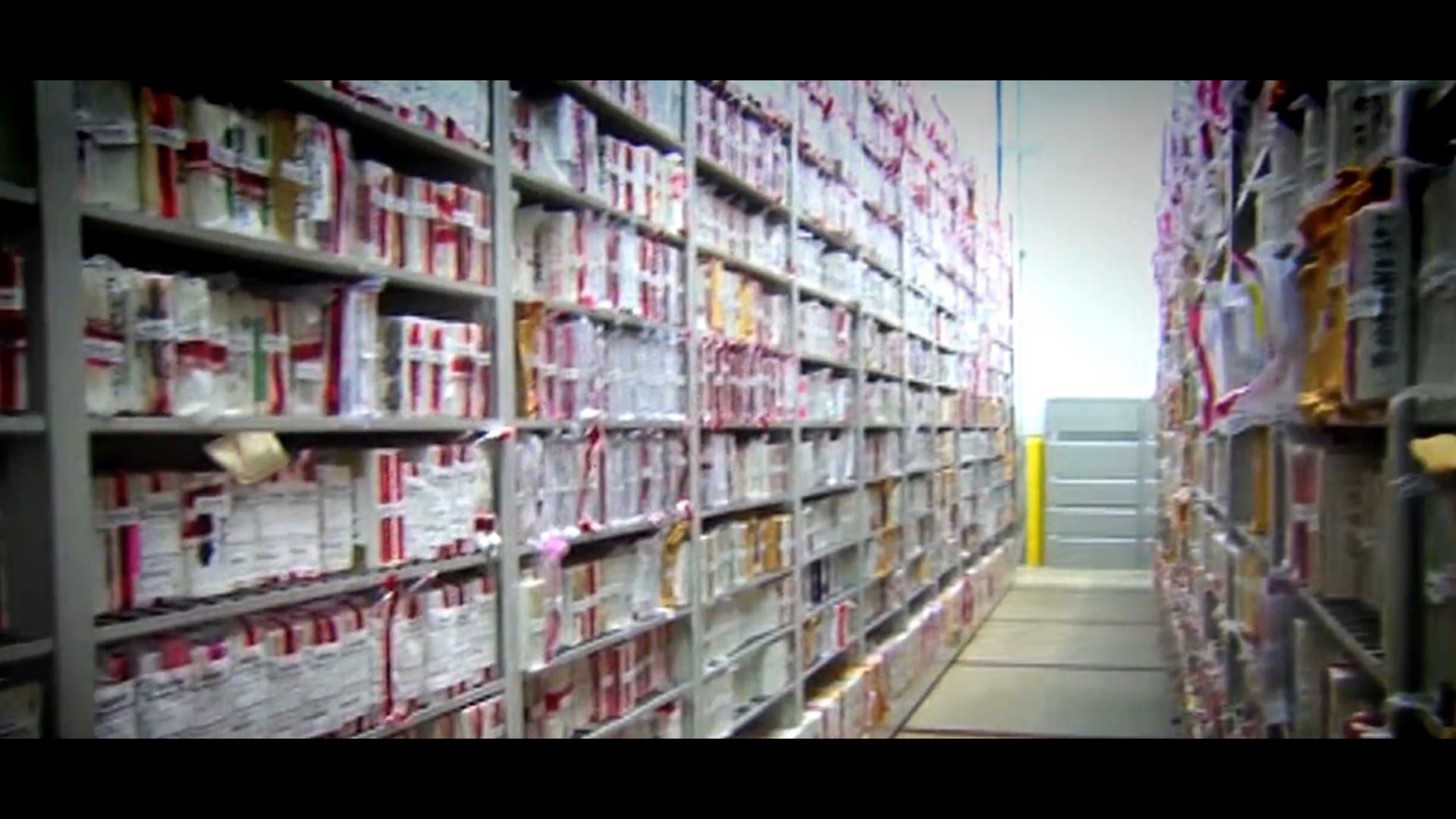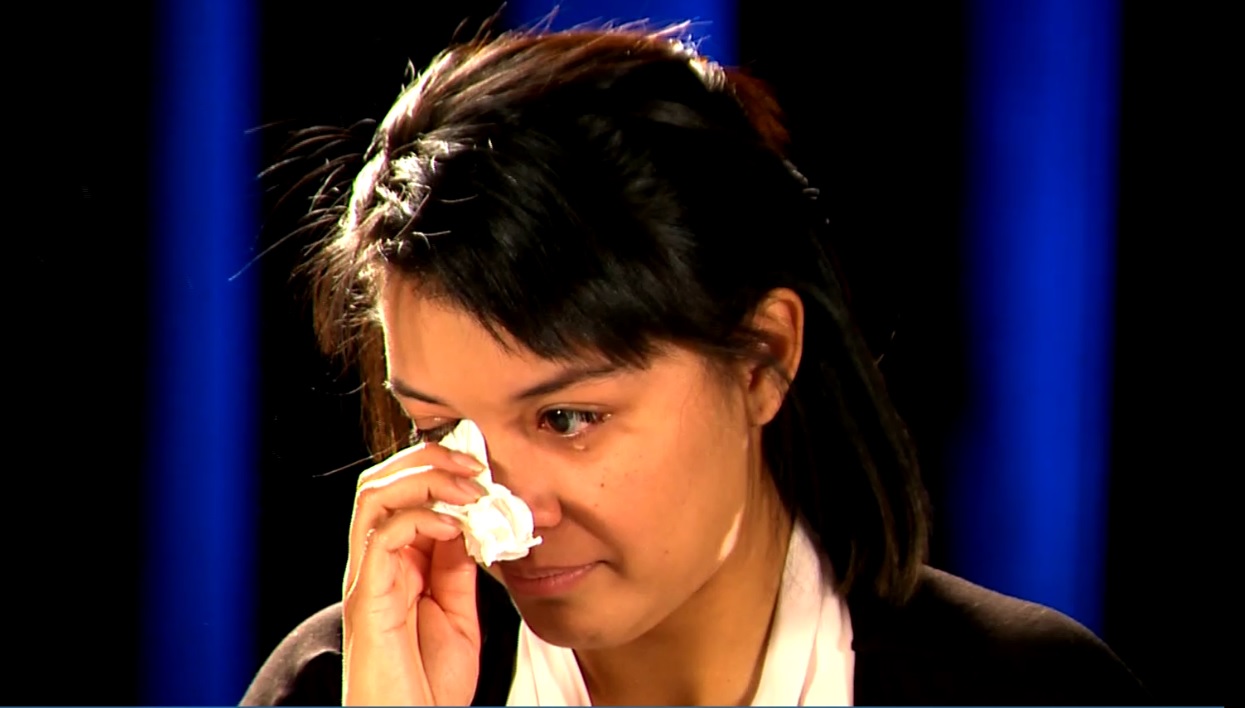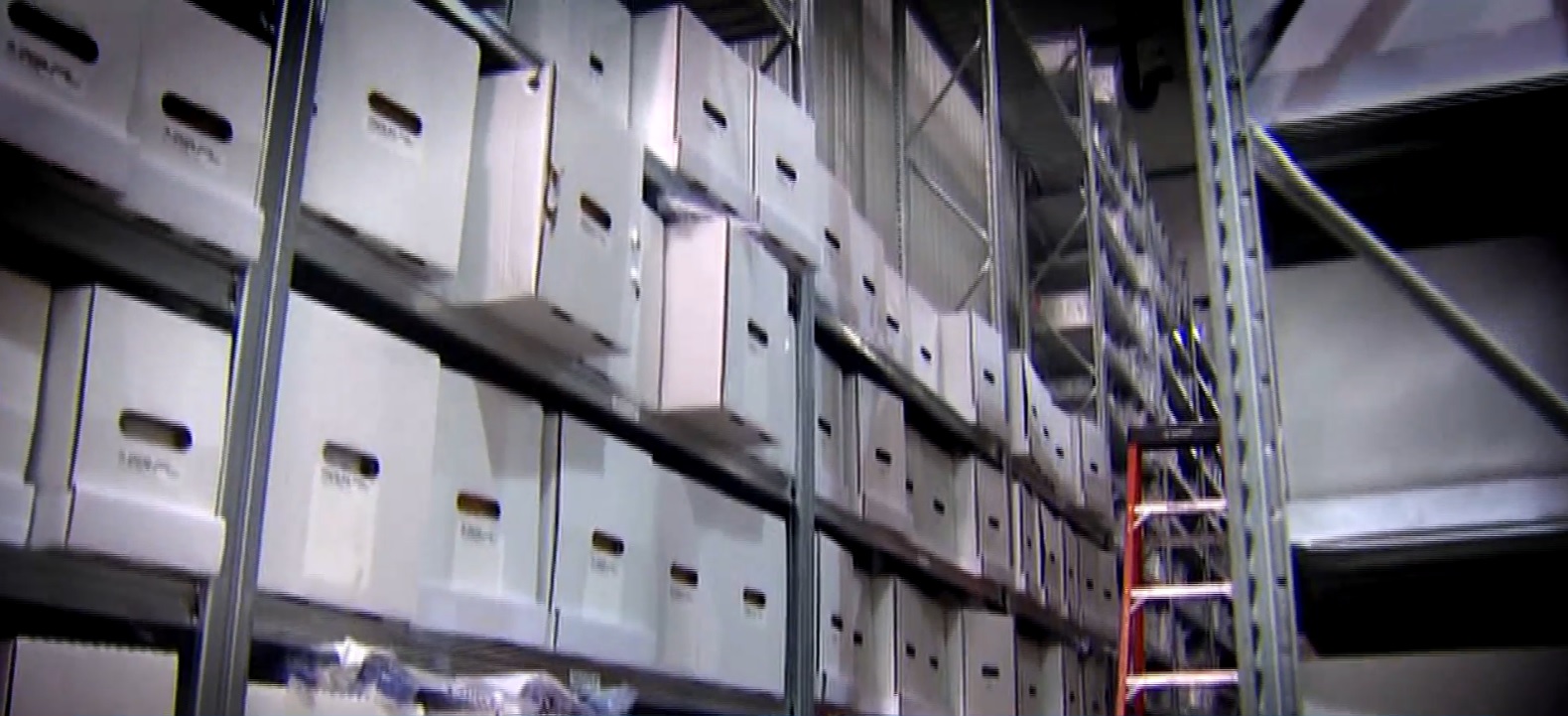TEXAS SEX CRIMES: As rape kits pile up around the state, victims go ignored, predators walk free
<p>KVUE’s Cori Coffin looks into how this crisis got so bad and whether the backlog can ever be eradicated for good.</p>

Call your lawmaker
There’s not just one person or group to blame for this problem – just like there’s no one solution. A collective change must happen at all levels of government and in every facet of the process. That includes contacting lawmakers and urging them to make this issue a priority.
Find your local, state and congressional leaders by your address.
A rape survivor's story
AUSTIN -- “The first time it happened, there was a lot of pain, a lot of yelling,” Ginnie Mayen was first raped at five years old.
“I remember I was crying a lot … His face was just like right [here] — just looking at me and he had this malicious smile.”
“I remember I was crying a lot … His face was just like right [here] — just looking at me and he had this malicious smile.”
Mayen speaks with the eyes of someone aged beyond her years.
“It happened multiple times from about preschool to first grade,” she recalls.
When Mayen threatened to tell her mother, her predator started laughing.
“He said ‘Go ahead and tell her. I'm going to tell her you wear her heels.’”
In that moment, the memory washes over Mayen and she remembers why she never reported that first rape.
“I was afraid she was going to be mad about the shoes,” said Mayen, sobbing. “Now I remember. That’s why. And you’re so little, you don’t understand. She’s not going to care about the shoes. She cares what’s happening with her little girl.”
Mayen had multiple attackers. They knew each other: two men with wives, each with two sons.
“[The first man] was in my room and the second gentleman comes in, and he's like ‘what are you doing?’ And it's like, “What a stupid question. What do you mean what is he doing? He's raping me. That's what he's doing.”
She’d hoped he would put a stop to it. He didn’t.
Then there was the time Mayen thought one of their wives would put a stop to it when she walked in. She didn’t.
“She just sits down. And she’s just watching,” said Mayen, in disbelief. “She let him continue.”
Mayen believes she would have told authorities if they had done a check-up, which is standard procedure for 911 hang-ups or prank calls.
Mayen also recalls another time she could have gotten help and didn’t. A school nurse checked for abuse and found some, but never reported it to authorities or Mayen’s mother.
Mayen began to wonder if it was her. Maybe she was doing something to cause this.
“Maybe I’m wearing the wrong clothes,” thought Mayen. “Maybe what I’m wearing is saying I’m okay with what you’re doing.”
Her body hadn’t even developed yet.
Even though the rapes stopped after first grade, the nightmares stay with her.
“In third grade, I remember waking up and I wet the bed,” said Mayen. “It was a nightmare I just went through all over again.”
For many reasons, Mayen shouldered her burden in secret until she was 23.
“I didn’t want my mom to think she was a bad mother,” explained Mayen. “I didn’t get very much time with her because she worked three jobs. So the time we spent together, I wanted it to be happy.”
She only just told her mother this year. It was difficult and cathartic.
“She told me, ‘A lot of things make sense now,’” said Mayen of her mother.
Mayen has a son of her own now. When she first got pregnant she was terrified it was a girl. Even though she was relieved to learn she was having a boy, she is still very protective of his young life.
Her relationships suffer too.
“I’m learning how to cope with the triggers, with the panic attacks,” she explains. “A random person can just come up to you and pat you on the back. And it triggers it and you relive that moment all over again. It can take you back to, you know, how it all started with a pat on the back.”
Therapy has taken her far from her five-year-old self. But closure will never be enough.
"What they do to you is for life. It’s a life sentence.”
“I want justice,” said Mayen. “I want them to pay for what they robbed me of. What they do to you is for life. It’s a life sentence.”

The backlog and 2011’s big push
Ginnie Mayen never got a rape kit. Only a third of rape victims do, according to the Rape, Abuse & Incest National Network (RAINN).
But those who do may not see justice either.
Only five percent of rape victims will see their kits tested in 60 days.
According to the latest statistics from the Texas Department of Public Safety – obtained by the University of Texas – only five percent of rape victims will see their kits tested in 60 days.
Ten percent of kits are tested in 90 days or less. Just over half (53%) take longer than 90 days.
The data is based off 7,637 kits submitted to DPS through 2015 and 2016.
Of the ones who don’t get tested, some will take years.
“Every single kit that’s sitting on a shelf is a person,” said Kristen Lenau, response coordinator with SAFE – one of several, advocates working to end the backlog in Texas.
“What does that say to the victim?”...I think, what it says is the state of Texas doesn't give a damn...Shame on us."
At last count, Texas leads the nation in untested kits at 19,051. That’s according to an audit of all state labs by DPS in 2011. There has been no official count statewide since then.
“If one sexual assault kit goes untested, we have a problem,” said state Rep. Roland Gutierrez (D-119).
He wants to see the governor make this an emergency item.
“What does that say to the victim?” he asks. “I'm sorry but we didn't test this rape kit. What does that say to them? I think, what it says is the state of Texas doesn't give a damn. And that's just a shame. Shame on us. We have to do better.”
In order to do that, we have to understand how we got here.
In 2011, Texas passed Senate Bill 1636 requiring kits be sent to labs within 30 days. The law also required a count of the backlog. They found 20,000. So lawmakers put up $11 million to test all the kits.
As of March 2017, there were 3,600 of those kits left (older than 2011). But that doesn’t include all that have built up since then, which number in the tens of thousands, according to reports from law enforcement agencies around the state.
Where did we go wrong?
“There was a big effort to address the backlog,” explained State Representative Donna Howard (D-48). “I think the numbers ended up being larger than anticipated and unfortunately, as time went on the backlog grew.”
“The numbers we’re talking about here are unfortunately astronomical... We are looking at testing kits from the early 1990s."
For years, she’s been working on solving this problem for good. “The numbers we’re talking about here are unfortunately astronomical,” added Howard.
“We are looking at testing kits from the early 1990s,” said Lenau.
“The fact that we haven’t tested thousands of rape kits across the state is criminal, in and of itself,” said Gutierrez.
Except it’s not.
The loophole that’s keeping kits on shelves
There’s no law in Texas requiring kits be tested within a certain time frame – just “when feasible.”
House Bill 1171 sought to change that to 60 days. It failed to advance out of House Committee because it’s an unfunded mandate – requiring labs test the kits whether or not Texas picks up the tab.
Who is responsible for this issue?
“I believe it’s the legislature,” said State Representative Victoria Neave (D-107). “(I believe) that we as legislators, when we look at the budget, determine what the priorities are whenever we fund them.”
While Neave is happy the Senate added $4.2 million dedicated solely to ending the backlog, “it’s not enough,” she said.
According to Neave, kits cost $500-$2,000 depending on the amount of DNA. Testing 20,000 kits, for example, would cost $10-$40 million.
The lack of labs in Texas
Even if lawmakers decided to allocate all $40 million, the next roadblock is resources.
“The problem is capacity,” explained Gregg Cox, director of operations with the Travis County District Attorney’s Office. “There are only so many scientists even qualified to do this kind of testing. Only so many labs.”
According to the Texas Forensic Science Commission, there are just 19 labs in Texas. To compound the problem, Austin’s shuttered DNA lab sent pending cases flooding the market.
“We faced many challenges,” explained Assistant Chief Troy Gay with Austin Police Department. “We didn't understand potentially the gravity or the depths of the challenges that we had.”
At his last audit to city councilors in March, Gay counted 2,535 cases awaiting DNA testing. Two-thirds of those (1,686) are sexual assault cases.
The Travis County District Attorney’s Office is feeling the pinch too – with 112 pending indicted cases awaiting DNA results.
The number of pending cases for sex crimes (40%) double homicides (20%). Yet the clearance rate for murder is much higher.
According to the most recent DPS report, 71 percent of murders resulted in charges in 2015. Just 38 percent of rapes resulted in charges in 2015.
In Austin, 74 percent of murders resulted in charges, compared to 49 percent of rapes, according to the most recent data.
“I think it’s the dynamics within each of the cases,” said Gay when asked about the discrepancy. “With sexual assault, it’s about proving that particular case when you have two individuals who are giving different stories. So you have to really work with the evidence. You have to really have the information. So those are somewhat very, very difficult to prove.”
“Why not start by testing the kits to see if these cases can even move forward?” asked KVUE’s Cori Coffin.
“Absolutely,” Gay agreed.
Side effects of testing the kits
Ending the backlog doesn't just give a voice, some little piece of life, back to these victims.
It also helps ensure the safety of the general public. The DNA in these kits is often connected to other unsolved cases – sometimes violent crimes – identifying habitual offenders living down the street.
A St. Louis woman got justice when a lab tested her kit 18 years after her rape. In Memphis, a rape kit solved a 12-year-old cold case.
Testing the kits does one other important thing: it exonerates the innocent.
"In many ways, I think we don’t want to hear the stories of survivors because they make us uncomfortable.”
A Texas man spent 12 years in prison before a DNA test exonerated him in a 1990 rape case.
Mayen is haunted by the notion that her attackers are still living in Austin, possibly victimizing other children.
“These people are still alive,” she said. “I want justice. I want them to pay for what they did.”
Who is at fault for this crisis?
“I don’t think we can place it on any one party or any one system,” said Lenau, reflecting. “I think it’s a variety of factors. I think society ignores sexual violence. In many ways, I think we don’t want to hear the stories of survivors because they make us uncomfortable.”
The Bombshell at Baylor
Jasmin Hernandez is an example of Lenau’s point.
She’s the only survivor to come forward publicly in the Baylor sexual assault scandal. In April, Hernandez met with lawmakers to explain her lawsuit against Baylor – and to advocate for stronger punishment against Title IX offenders.
“They said that because it was an off campus event – even though it was between two students – they wouldn’t even let me file a report.”
“First, I went to the Baylor Health Services to get a psychological evaluation and sort of proceed in that direction,” she explained.
They told her they were booked for the semester.
She went to Baylor Police.
“They said that because it was an off campus event – even though it was between two students – they wouldn’t even let me file a report,” she said.
Hernandez is suing Baylor, accusing the university of violating a state law that requires campuses to protect students.
“It’s not just neglect at this point,” explained Hernandez. “It’s a complete turnaround of the culture within the administration at the school and what they should be doing.”
And it wasn’t just Hernandez.
“Women were placed on academic probation,” said Gutierrez, who is particularly passionate about strengthening laws to support student victims of sexual violence. “Women were threatened with their scholarships. Women were threatened with expulsion because while they were getting raped if they were drinking at a party, the university had a problem with that.”
In all, Baylor reported 125 cases from 2011 to 2015.
Despite all those reports, very few resulted in any investigation or charges.
“Society has done a lot of victim blaming,” added Howard. “So the victim is put in the position of having to justify what they’ve done – almost putting them on trial. It discourages a lot of people from reporting and following through.”
Hernandez’ attacker – Tevin Elliott – is one of only two Baylor students to be convicted of sexual assault. The other case has been overturned on appeal.
“It feels very relieving,” reflected Hernandez. “I feel very lucky that my case worked out.”
A rape victim feels lucky. Because her kit was tested. Because it wasn’t lost.
The lost evidence
“If we can’t follow through and help victims of crime, victims of rape, then our system has failed.”
“As I’ve done this, I’ve found out they really can lose the evidence in the process,” said Howard. “You’ve got the facility where the exam is done, whether it’s SAFE or a hospital. That evidence is collected. It’s then stored sometimes in a facility. Law enforcement picks it up. They get it to a lab. They get it back to law enforcement. There’s a long process going through many hands.”
“If we can’t follow through and help victims of crime, victims of rape, then our system has failed,” said Gutierrez.
Is the justice system failing people right now?
“I feel like the …” Cox paused a moment, collecting his thoughts. “That’s a good question. I think the legal system is doing the best it can to cope with this very real, very large problem. But the lack of resources, the lack of available labs and the stresses that this is putting on the system are really having an impact on everyone.”
Crowdfunding the kits
The lack of money has some survivors even asking if they can pay for their own kits. Unfortunately, privately funding the testing of forensic evidence would be a conflict of interest in a criminal case.
Even if it wasn’t, “this is our responsibility as a state to process evidence,” said Neave. “We don’t ask the victims to pay for the testing of evidence in other cases. We shouldn’t be asking them to do that now.”
So Neave is turning to crowdfunding for sexual assault kits. Yep – crowdfunding.
House Bill 1729 and House Bill 4102 would allow people to donate to the fund when renewing driver’s license and vehicle registration.
“While I think our state should be fully funding this issue, the fact of the matter is that it’s not,” added Neave. “So we wanted to come up with another revenue source which can help pay for the kits.”
Early estimates are that these bills could bring in around $1 million a year.
Tracking the kits
Howard is turning the kit tracking system into the digital age with House Bill 281.
“Same kind of thing like when you’re tracking an amazon package,” she explained.
Every item in a rape kit – including ancillary items like clothing and bedding – is given a barcode accessible online by the survivor at any time.
“They have access to the system so they can have some control over what’s going on,” added Howard.
In addition to ensuring key forensic evidence doesn’t get lost, this electronic tracking system adds a layer of anonymity for the victim.
“Same kind of thing like when you’re tracking an amazon package.”
To find out the status of your kit right now, “you have to call law enforcement and you have to find the appropriate detective or person responsible,” explained Howard. “They then have to look up and find out what they can about where your particular evidence is in the system.”
It’s a cumbersome process. One that takes many resources, which would be freed up with this system.
According to Howard, the state has allocated $1.5 million dollars for it.

Bills dealing with Universities
Gutierrez is spearheading House Bill 4040, a pilot program to make sure student victims have a support line to call to know how and where to get help.
“The fact that I ended up at the hospital (the night of my rape) was not my decision,” said Hernandez. “I told a group of friends that I had just been raped and one of my friends made my decision for me. Had I been in a position to have to make that decision alone, I don’t think I would have done that. I didn’t know to do that.”
“We can’t stop criminality,” added Gutierrez. “But we have to be more supportive of the women that are the victims of this heinous crime. And we haven’t done so.”
“At a session where we’re being told that this bathroom thing is important; transgender folks are going to rape your women and children; the (so-called) ‘sanctuary cities bill’ that says the Mexicans are going to come in and rape everyone; it just seems like we have incidents of rape here in our own backyard.”
State Sen. Kirk Watson (D-14) has also proposed a series of bills aimed at strengthening support for student victims.
Senate Bill 966 protects minors who report sexual assault, from being prosecuted for underage drinking.
Senate Bill 967 changes the definition of ‘consent’ to a verbal ‘yes.’ In other words, ‘no’ means ‘no,’ but the absence of ‘yes’ also means ‘no.’
Senate Bill 968 gives students an option to report sexual assault electronically and anonymously.
Senate Bill 969 protects students from disciplinary action if they report a sexual assault.
Senate Bill 970 requires all college campuses to have a consent standard.
Senate Bill 970 requires all college campuses to have a consent standard.
All these bills have received bipartisan support.
“More and more people are learning what’s going on here and removing some of the stigma attached to it too,” said a hopeful Howard.
Still, Gutierrez believes we have a long way to go.
“At a session where we’re being told that this bathroom thing is important; transgender folks are going to rape your women and children; the (so-called) ‘sanctuary cities bill’ that says the Mexicans are going to come in and rape everyone; it just seems like we have incidents of rape here in our own backyard,” he said.
What Austin’s doing
Austin Police Department is looking at implementing a system locally that will wipe out the backlog and keep the testing of future kits under control. APD is partnering with DPS to form the Capital Area Regional Lab to achieve this.
“We hope that within the next 12 months, we’ll never be put in this position again as an agency because we owe it to the survivors out there."
It will take about a year to get all the personnel trained and proper procedures in place.
“We hope that within the next 12 months, we’ll never be put in this position again as an agency because we owe it to the survivors out there,” said Gay.
In the meantime, three private labs – Sorenson, Signature Science and Bode Cellmark – will test 60-100 kits a month.
“I think sometimes there has been a judgment that this has not been a priority for our department,” reflected Gay. “What I can tell you is that this has been one of the top priorities in our department.”
Gay also credits the city of Austin for allocating money to double the size of the current lab.
Learning from Houston’s example
As many cities are beginning to realize, the support must be constant.
Houston ended its backlog in 2015 by outsourcing the kits to private labs with federal dollars. When the backlog started creeping back up in 2016, the city allowed for new lab tech hires and overtime pay to keep it in check.
The Bottom Line: can the state REALLY afford to test the kits? Yes.
Even at 20,000 untested rape kits, it would cost the state a maximum of $40 million.
That amounts to .02 percent of the $218 billion budget for 2018-2019.
Lawmakers allocated $4.2 million.
More is spent on:
- Enforcing bingo laws and marketing for the lottery – $18.2 M
- Film & music marketing – $9.9 M
- Capitol grounds upkeep – $8 M
- Courthouse preservation – $19 M
- Renovating the LBJ state building – $20.9 M
- Maintaining and operating the Alamo – $77 M
Call your lawmaker
There’s not just one person or group to blame for this problem – just like there’s no one solution. A collective change must happen at all levels of government and in every facet of the process. That includes contacting lawmakers and urging them to make this issue a priority.
Find your local, state and congressional leaders by your address.


